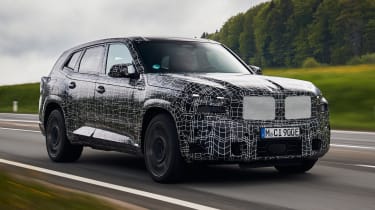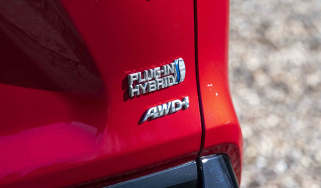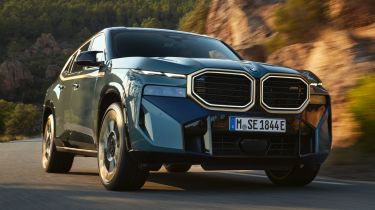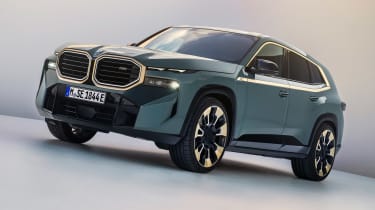New BMW XM launches with 644bhp hybrid V8 engine
The striking new SUV from BMW has searing acceleration and averages up to 188mpg
- First plug-in hybrid M model
- 644bhp and 188mpg
- Even more powerful ‘Label Red’ variant expected next year
The BMW XM takes the German firm in a bold new direction – it’s the first M performance car to be electrified and the first bespoke M model since the M1 supercar. The £144,980 and 644bhp SUV will celebrate the 50th anniversary of the BMW M division with a plug-in hybrid V8 powertrain and bold styling.
The new BMW XM will take on tough competition in the fast SUV segment, joining the Bentley Bentayga, Aston Martin DBX, Lamborghini Urus, and Porsche Cayenne. BMW hopes its 644bhp – which is split between a turbocharged V8 engine and electric motor – will tempt buyers looking for a powerful SUV without the extreme running costs. For those that aren’t convinced, a ‘Label Red’ model will arrive next year with 748bhp.
 The top 10 fastest SUVs in 2025
The top 10 fastest SUVs in 2025
The BMW M3 Touring estate, M4 CSL, and new BMW M2 have already been announced this year as more traditional M division vehicles. They’re likely to be the last of the solely combustion engine powered M cars, as the XM takes the brand in a new electrified direction.
Design
The XM’s styling is similar to last year’s concept, with a huge pair of nostrils that elevate BMW’s signature kidney grilles into the exterior’s most prominent feature. Twin headlights punctuate the nose, while its flanks have an angular wheel arch design. Standard alloy wheels will measure 21-inches, but 22-inch, and even 23-inch sizes will be optional.
A profile view of the car reveals squared off wheel arches, black bodywork cladding and a set of large alloy wheels. The roofline slopes gradually towards the rear of the car along with an upswept window line leading to an angular C-pillar.
Interior
Inside, several interior components will be familiar to BMW iX owners, with the twin 14.5-inch screens and head-up display carried over. It runs an M-specific version of the brand's iDrive software, which gets unique displays for the hybrid system and EV driving mode. The XM will get an M steering wheel, seats, and pedals, while carbon fibre inlays will also feature on the steering wheel and paddle shifters. Boot space is larger than the iX model at 527 litres, although the XM is a five-seater only.
Keeping the XM in line with other M performance models is lashings of red detailing, similar to the BMW M5 and BMW M8. The thick bolstering on the front seats will also be familiar to M car drivers.
Engine
The plug-in hybrid powertrain will get 55 miles of driving range, meaning most drivers will be able to manage daily errands and the commute on battery power, only using petrol when they want to exploit the XM’s performance or go on a longer journey. Acceleration figures are quoted at 0-62mph in 4.3 seconds, with a top speed of 155mph, although this can be optionally raised to 168mph.
The twin-turbocharged 4.4-litre V8 creates 482bhp on its own, with electric motors making up the difference for a total of 644bhp, supplied by a 25.7kWh battery pack. Combined fuel consumption is quoted at 188.3mpg.
The first customer deliveries are expected to arrive in early 2023, with a starting price of £144,980 before options.
BMW XM prototype review by Sean Carson

The BMW XM is a huge departure from traditional M cars like the M2 and M3. Huge is the right word, actually; BMW’s drivetrain engineer mentioned that the production-ready XM will weigh over 2.3 tonnes.
Fittingly, the 4.4-litre V8 and 161bhp electric motor are very potent, serving up a combined output of 644bhp. The motor produces 161bhp in normal modes, but can produce 194bhp for up to 10 seconds at a time. Zero-to-62mph acceleration is quoted at under five seconds.
We’d argue that it doesn’t feel quite as fast as that, though. The XM seems to lean quite heavily on the electric motor, and tries to be more evocative with piped-in V8 noise. BMW’s engineers did say that the powertrain could go up to the numbers mentioned on the Concept XM - perhaps a Competition or CS model is in the pipeline - and it could be used in the next BMW M5, too.
The plug-in hybrid technology looks to be impressive. BMW quotes an electric range of around 50 miles, but that may be underselling it judging by our test car, with its 60-mile estimate. Two regenerative braking settings are available, but neither are particularly strong. There’s no one-pedal driving setting, as it’d upset the balance of the car, we were told.
Clever anti-roll technology helps the XM to corner impressively flat, with none of the body roll that such a heavy car should have. It feels agile despite its size and it feels confident and grippy, even if the steering could do with a lot more feel. The suspension is firm on the standard 22-inch wheels; we expect it’ll be no softer on the optional 23s. That was in the most comfortable setting. Sport and Sport Plus dial up the firmness further still, to the point where the ride is unacceptable in what's going to be a six-figure luxury SUV.
The seats are comfortable, mind, and the interior is a mix of the familiar and the opulent. Rear-seat legroom is very generous. Even with the batteries stashed under the rear seats and a tapering roofline, headroom is good enough as well. Boot space could arguably be better; there’s a high floor but nowhere to hide the charging cable.
To learn more about the BMW M range, read our reviews of the M5 saloon and the M8 coupe here.
Recommended

New Smart #5 Brabus is a 637bhp far cry from the brand’s city car past

Petrol and diesel car ban relaxed with hybrids permitted beyond 2030
Most Popular

Omoda E5 targets rivals: now with zero deposit and APR

Ford Puma Gen-E driven: Electric charmer or too little, too late?
Tips & advice

Car dashboard warning lights: what does each symbol mean?

Electric car charging stations: public networks, charger types, apps and maps











